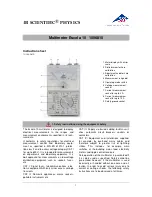
2
•
Carefully read the instruction manual before
using the multimeter and obey the instruc-
tions therein.
•
The multimeter may only be used by per-
sons who are able to recognise the risks of
contact and take due precautions to avoid
them.
This multimeter is not a toy and must not fall into
the hands of children.
•
Do not place it, keep it or use it anywhere
within reach of children.
•
When the multimeter is used by teenagers,
trainees etc., a suitable person should su-
pervise to ensure the equipment is used
safely.
•
If measurements are made where there are
any risks of coming into contact with electric-
ity, a second person is to be informed.
The assumption needs to be made that unfore-
seen voltages may be present in the vicinity of
objects being measured (e.g. faulty equipment
or capacitors).
•
Before using the multimeter, check the
housing and measuring leads for damage
and if there should be any malfunctions or
visible damage, the multimeter is not to be
used. Pay specific attention to the insulation
for the measuring sockets.
•
Be particularly careful when measuring volt-
ages in excess of 33 V AC (RMS) or 70 V
DC.
•
For voltages which are in excess of 33 V AC
or 70 V DC, only use safety measurement
leads conforming at least to CAT II.
•
The authorised measuring range is not to be
exceeded. If measurements are made when
the magnitude of the variable is unknown,
always select a large measuring range be-
fore shifting down to lower ones.
•
The multimeter may not be used to make
measurement on circuits which exhibit co-
rona discharge (high voltage).
•
Particular care is to be taken when making
measurements on high-frequency circuits
where dangerous voltages may arise due to
superimposition of components.
•
Make very sure that the voltage value be-
tween the measured contact and earth or
between the ground socket and the meas-
urement socket does not exceed 1000 V.
•
In order to check that the multimeter is ready
to use, select the battery test function. Af-
terwards, it is then possible to check that the
voltage source is disconnected and no volt-
age is present.
•
The multimeter may only be used in a dry,
dust-free environment with no risk of explo-
sions occurring.
•
When measuring current in a circuit, make
sure to switch off the power before connect-
ing the multimeter into the circuit.
•
When making measurements, always con-
nect the ground lead first. Disconnect the sig-
nal measurement lead before unplugging the
ground.
•
Turn off the multimeter before opening the
casing, disconnect the power to the circuit
and the measuring leads from the multime-
ter.
2. Symbol legend
Hazard, read instruction sheet
V
Voltage
A
Current
Moving coil galvanometer
Apparatus with electronic amplifier
DC quantities accuracy class 2
AC quantities accuracy class 3
Use in horizontal position
Use in vertical position
DC quantities
AC quantities
Needle position zero centre
“OFF” position
Measuring category as per IEC EN
61010-1
Double insulated casing
CE
EU conformity mark
Earth symbol
┴
Ground symbol
Battery symbol
3. Technical data
Dimensions:
98 x 148 x 49 mm approx.
Weight:
300 g approx.
Scale length:
80 mm
Pointer deflection
0…90°
























